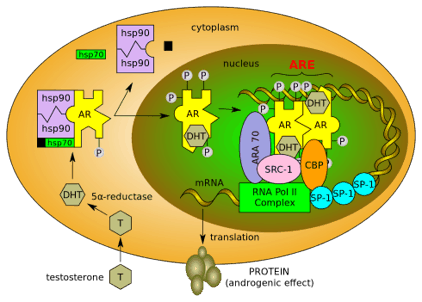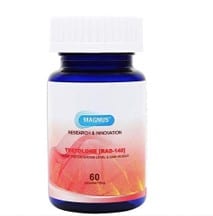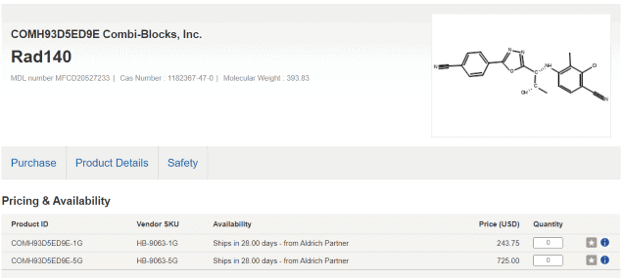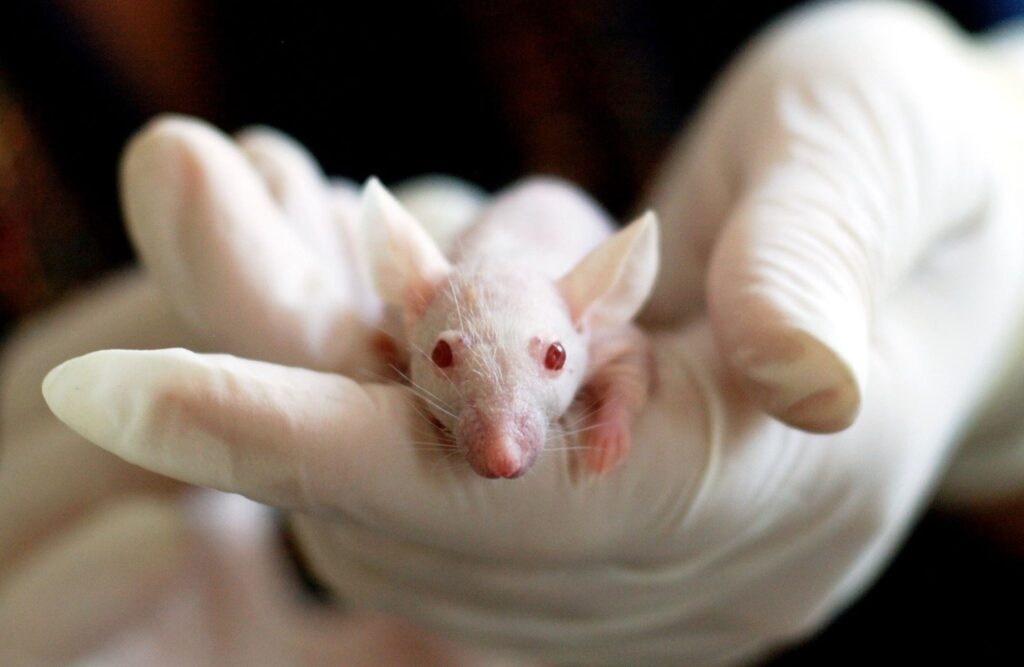This review is written with the intent to be as unbiased as possible. However, it represents the opinion of an individual reviewer and is therefore subjective. Furthermore, at Nebula Genomics we seek to educate the public about the benefits of Whole Genome Sequencing. Information about our Whole Genome Sequencing DNA test is therefore incorporated into the review.
March 8, 2021
What do you want to learn from Whole Genome Sequencing?
Table of Contents
7 Facts from our RAD 140 Review
- Location: London, England
- Products: an investigational nonsteroidal selective androgen receptor modulator (SARM) developed to replace exogenous testosterone replacement therapy (TRT)
- Costs: $42
- RAD 140 Results: This is experimented for the treatment of conditions like muscle wasting and skeleton wasting (osteoporosis), and suppression of breast cancer
- How safe is it: it is an experimental drug, not approved for human consumption
- Recommended dose: there’s no recommended dose yet
- Alternative products: Nebula Genomics 30X Whole Genome Sequencing DNA Test is the most comprehensive DNA test that decodes 100% of your DNA with extremely high accuracy
Edited by Christina Swords, Ph.D.
Disclaimer: While RAD 140 is not illegal to have, it is illegal to sell and banned in professional and amateur league sports. This review provides scientific information publicly available through the clinical and scientific literature.
RAD 140 is an unsafe experimental drug not approved for human consumption. Do not take it under any circumstances.
RAD 140 Introduction
RAD 140, also known as Testolone, is an investigational selective androgen receptor modulator (SARM) developed to replace exogenous testosterone replacement therapy (TRT). In 2014, Researchers at the University of Southern California, Los Angeles, conducted a study using rats, and they found the compound to be safer than TRT. Although not approved by the FDA, this unofficial drug has become popular among bodybuilders and those with low testosterone levels. These people believe testolone increases muscle-building, fat loss, and physical performance effects, including an increase in sex drive. It is classified as a prohibited substance by the World Anti-Doping Agency. Unlike a similar compound, SR9009, RAD 140 requires a post cycle therapy (PCT), similar to other SARMs like LGD 4033.

Being an experimental drug, little is known about RAD 140. It is not approved by the FDA and is considered unsafe for human consumption as it may cause dangerous health effects.
In the lab, this drug is being investigated to treat conditions like muscle wasting and skeleton wasting (osteoporosis) and suppression of breast cancer in models that are positive for both androgen and estrogen receptors (AR/ER+). It may also be relevant to other conditions such as Alzheimer’s disease.
It was discovered and initially developed by Radius Health, Inc. (RDUS), a company founded in 2003. In 2017, the first-in-human study was initiated in patients with breast cancer. Three years later, in 2020, it was licensed to Ellipses Pharmaceuticals.
Radius Health’s history is deeply rooted in science. They perform several types of research focused on disease areas with significant unmet need for new treatment options to help improve the lives of patients. Radius successfully sold its second oncology pipeline asset – RAD140 – to Ellipses Pharma Limited in 2020, completing Radius’ divestment of its oncology assets.
Ellipses Pharma, the company that now owns RAD 140, is an international drug development company. It is headquartered in London by a world-class leadership team.
A single case report of drug-induced liver injury was reported in 2020 after RAD 140 was published. Once the first stage of the clinical trial is completed, a better understanding of its safety, toxicity, and potential adverse effects will be known. For now, that information is not officially available.
Review of RAD 140 Science
RAD 140 belongs to a class of compounds called selective androgen receptor modulators, or SARMs. These receptors bind to androgen receptors in the body, increasing androgen activity. An androgen is a hormone naturally produced by the body that plays a crucial role in male reproductive activities such as testosterone, androstenedione, and dihydrotestosterone.
SARMS tend to have similar effects in the body because they bind to the same receptor. However, RAD 140 SARMs specifically target muscle and bone tissue, as well as the liver. Many people believe that testolone RAD-140, being a SARM, could have lesser side effects than testosterone or other steroids. However, there’s no data that backs up this hypothesis. They are used as experimental drugs for the potential treatment of hormone-related or muscle-wasting disorders because of their selectivity to these areas of the body.
The unique ability of RAD 140 to target these specific parts of the body has made it a choice over testosterone or steroids among bodybuilders. Most of the examinations conducted on the drug so far have been performed with laboratory animals. Therefore, little is known about how it will interact with the human body. It is generally discouraged from use since it has not been approved for any human use yet.
Biochemically, RAD140 works by selectively stimulating hormone receptors in the body. The ability of SARMs to target specific parts of the body is not fully understood yet. Based on clinical studies conducted on rats, some researchers believe that RAD 140 could activate receptors in injured regions of the brain. The study revealed that the brains of rats subjected to this drug have increased activity of MAPK, thereby protecting its neurons from damage.

Human androgen receptor (AR) and androgen binding. Wikipedia. Figure by Jonathan Marcus, based on an original drawing by Dr. Marianne D Sadar (Meehan KL, Sadar MD. Front Biosci. 2003 May 1;8:d780-800).
Research is ongoing about this drug’s role in fighting breast cancer, increasing muscle gain, and protecting brain cells.
SARMs have also been investigated for the treatment of osteoporosis, sarcopenia, and cachexia. However, the US Food and Drug Administration (FDA) does not approve their use in clinical practice.
A 52-year-old man developed drug-induced liver injury after taking Alpha Bolic (containing RAD-140) and Alpha Elite (containing both RAD-140 and LGD-4033) supplements. A liver biopsy showed that he had diffuse centrilobular canalicular cholestasis, mild lobular inflammation, prominent ductular reaction, and rare non-necrotizing epithelioid granuloma suggestive of drug-induced liver injury.
RAD 140 Review
How to Get RAD 140
Note that this compound is not approved by the FDA; therefore, it should not be consumed by humans and may pose dangerous RAD 140 side effects. You can find Rad 140 for sale online only in certain countries. Although it should still only be used for experimental purposes, you can check online stores like Amazon. All you need is to order the quantity you want, and it will be delivered.
If you work in an experimental laboratory, you can order the chemical from companies such as Millapore Sigma and VWR. It’s important to note that in most cases, you are required to provide a business address and documentation to prove that you are legally allowed to purchase this compound for experimental purposes.
How to take Rad 140
No RAD 140 dosage data is available since it is currently an experimental drug only to be used in laboratories for research purposes. Some anecdotal Rad140 dosage suggestions are 20 mg per day. However, these amounts are not clinically advised. No amount of this experimental drug is safe.
RAD 140 Cost Reviews
There are different brands of RAD 140, all selling at different prices.
Where it is legal, MAGNUS Testolone, Rad-140 (60 capsules/10 mg), sells on Amazon for $42. Therefore, each capsule costs $0.70.

You can also look into Rad 140 from Paradigm Peptides, which sells for $79.95 (60 capsules/10 mg).
For research purposes, 1 gram and 5 grams of RAD 140 cost $243.75 and $725 on Millapore Sigma. These compounds are for research purposes only and should only be purchased through experimental laboratories.

Privacy Reviews
Ellipses Pharma Ltd, the new company that acquired RAD 140, upholds the privacy of its customers. The link to the company’s privacy policy can be found at the down part of the company’s homepage. The policy was last updated in December 2020. The company collects and processes customers’ personal information to ensure they offer the best possible service.
Other RAD 140 Reviews
Since RAD 140 is an experimental drug, it has no user reviews.
RAD 140 in the News
During a phase I clinical trial, it was reported that a man developed serious liver injury while taking experimental drugs containing RAD 140. The biological effects were reversed after stopping the supplements for 3 months.
RAD 140 Pros and Cons
Pros (potential)
- Side effects of testolone may be less severe compared to testosterone or anabolic steroids
- May increase fat-burning and weight loss while also increasing lean muscle mass
- May protect brain cells
- May be useful for treating certain breast cancers
Cons
- Not approved by the FDA
- It is an experimental drug not suited for human consumption.
- Not much scientific evidence is available on this drug
- May cause liver injury
Nebula Genomics
The ability to develop muscles varies in individuals. It is why you may see two people engaging in the same physical exercise yet, having different physiques and muscle mass. Analyzing your DNA to see whether you inherit the gene to develop a higher muscle growth can help you decide the right drugs, food, and exercise you should be subjected to.
RAD 140 is being experimented with for its effect on not just increasing muscle mass, but also as a treatment for breast cancer. Many cancers are also hereditary; thus, knowing your susceptibility to the disease can guide you on the appropriate treatment or prevention to adopt. By analyzing a patient’s DNA, doctors can help determine who might be a candidate for this drug.
Nebula Genomics offers a reliable DNA test you can trust in this regard. Unlike other DNA tests that only decode 0.02% of your DNA, we decode 100% of your DNA with 30X Whole Genome Sequencing.
We also allow customers to access our Nebula Research Library, which will help them stay up to date with the most cutting-edge genomic research and learn how it applies to your DNA results.
With our genome exploration tools, customers can also find answers to any questions about their DNA and can stay up to date with the latest scientific research using the Nebula Research Library.
There may be better ways to get in shape than shady supplements like SR9009. For instance, you can sequence your DNA to determine what kinds of health and fitness your body is predisposed to. Check out these DNA companies that do just that:
- Athletigen (free upload and basic report; additional tests and reports available at an additional cost)
- DNAFit (in partnership with CircleDNA $189 – $629)
- Fitness Genes ($49 for data upload; up to $199 for DNA testing kits)
- Genomelink ($39 for fitness information)
- Genopalate ($69 for data upload; $189 for DNA testing kit)
- Helix DNA ($145 + additional cost for the apps)
- Living DNA (well-being kits start at $129)
- Orig3n ($29 – $150 for various DNA tests)
- Promethease ($12 for health information)
- SelfDecode ($59 – $289)
- Sequencing.com (fitness app purchased separately)
- Vitagene (diet and health, $99)
- Xcode Life ($20 each for fitness and health report)
Did you like our Rad 140 review? You can read more reviews on our blog and check out our complete guide to the best DNA test kit and other home tests.

